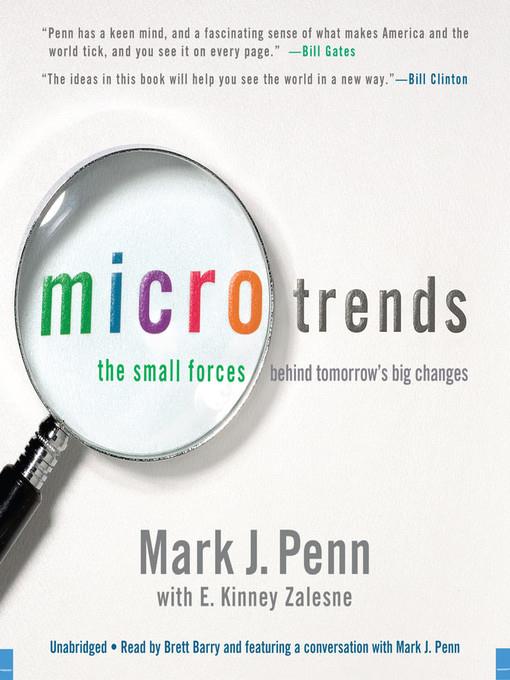
Microtrends
The Small Forces Behind Tomorrow's Big Changes
کتاب های مرتبط
- اطلاعات
- نقد و بررسی
- دیدگاه کاربران
نقد و بررسی

Take a timely look at an extensive inventory of small, sometimes unnoticeable, trends that are shaping and directing our economy, our society, and our world. In reading the tea leaves of these small movements, politicians, marketers, and entrepreneurs who get it right will be able to get the jump on those who await the coming of the significant movements as defined by the traditional polling apparatus. Narrator Brett Barry's pacing is excellent for the considerable amount of material the author covers: 75 intense identity groups who are demanding things that our current social structure isn't delivering. With a less able reader the listener could get lost--as the topics transition rapidly and often abruptly. M.C. (c) AudioFile 2008, Portland, Maine

September 3, 2007
From "Soccer Moms," the legendary swing voters of the mid-1990s, to "Late-Breaking Gays" such as former Gov. Games McGreevey (out at age 47), Burson-Marsteller CEO (and campaign adviser to Sen. Hillary Clinton) Penn delves into the ever-splintering societal subsets with which Americans are increasingly identifying, and what they mean. For instance, because of "Extreme Commuters," people who travel more than 90 minutes each way to work, carmakers must come up with ever more luxury seat features, and "fast food restaurants are coming out with whole meals that fit in cup holders." In a chapter titled "Archery Moms?", Penn reports on the "Niching of Sports": much to the consternation of Major League Baseball, "we don't like sports less, we just like little sports more." The net result of all this "niching" is "greater individual satisfaction"; as Penn notes, "not one of the fastest-growing sports in America... depends substantially on teamwork." Penn draws similar lessons in areas of business, culture, technology, diet, politics and education (among other areas), reporting on 70 groups ("Impressionable Elites," "Caffeine Crazies," "Neglected Dads," "Unisexuals," "America's Home-Schooled") while remaining energetic and entertaining throughout. Culture buffs, retailers and especially businesspeople for whom "small is the new big" will value this exercise in nano-sociology.

Starred review from September 15, 2007
A former pollster for President Clinton and a public relations CEO (Burson-Marsteller), Penn depicts a fracturing world in which people use the Internet to follow their interests and desires and find others like them. If a fraction of one percent of a population has a common interest, then identifying that interest can mean capturing millions of customers or voters, à la the soccer moms Penn detected and labeled in his work for Clinton. Having done extensive research in polls and statistical sources (all of it meticulously cited in endnotes), Penn, with former White House fellow Zalesne, presents 75 niche markets in all areas of modern life and describes service needs and marketing opportunities for each group (e.g., single women by choice). Many essays contain an International Picture sidebar explaining the relevance of a trend beyond the United States. Penn is at his best basing arguments on the numbers he adores and less convincing when his proof consists of anecdotal evidence and examples from popular culture. Sometimes he contradicts himself, which is to be expected in a book presenting the United States as a hundred Americas. Recommended for public libraries.Heidi Senior, Univ. of Portland Lib., OR
Copyright 2007 Library Journal, LLC Used with permission.

September 15, 2007
According to trend-spotter Penn (who trumpets his relationships with Bill Clinton and Bill Gates a little too enthusiastically), a microtrend is an intense identity group whose needs are not yet being met by marketers, politicians, and others. Microtrends are generated by small, under-the-radar forces, he tells us.Take extreme commuters, for example, people who travel at least 90 minutes to and from work each day. Only about 3.4 million people do this, but they are all interested in the same things: gas prices, comfortable vehicles, ease of taking in food while on the road, satellite navigation systems, and so on. Extreme commuters, Penn suggests, could be targeted by politicians and advertisers for their votes and dollars. Its an addictivelyinteresting book, with dozens of curious microtrend groups (such as male porn addicts, aspiring snipers, and shy millionaires), but readers might find that its a little superficial: Penn spends most of his time describing each intense identity group and not enough time explaining the significance of these groups and of microtrends in general.(Reprinted with permission of Booklist, copyright 2007, American Library Association.)

























دیدگاه کاربران